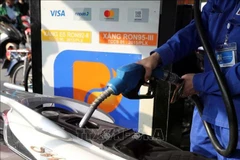 Foreign exchange rates in a flexible manner appropriate to the domestic and foreign markets to stabilise the forex market. (Photo: baodautu.vn)
Foreign exchange rates in a flexible manner appropriate to the domestic and foreign markets to stabilise the forex market. (Photo: baodautu.vn) Since the start of 2023, the world’seconomic growth has remained slow while global production and trading activities havestill faced numerous difficulties due to impacts of complex geopoliticaldevelopments and harsh weather. Centralbanks of many countries have continued tightening monetary policies and raised interest rates to curb inflation.
Meanwhile, under theNational Assembly’s policy and the Government and Prime Minister’s directionson cutting lending interest rates to help tackle difficulties facing the economy,businesses, and people, the SBV has reduced regulatory interest rates for fourstraight times, by 0.5% - 2% per year, though interest rates keeps rising aroundthe world.
The continuousreduction of the rates is assessed as a flexible solution appropriate to thecurrent market situation as it has paved the way for lowering lending rates toboost credit access for businesses and people so as to aid economic growth.
The SBV has alsoworked with the Vietnam Banks Association to persuade member institutions tocontinue cutting lending rates, by at least 1.5% - 2% per year, for bothexisting and new loans.
So far, interestrates have been falling, with deposit and lending rates for Vietnamese dongtransactions at commercial banks down over 1% - 2% per year compared to the endof 2022. They are expected to decrease further in the time ahead.
Meanwhile, the SBVhas pressed on with governing foreign exchange rates in a flexible mannerappropriate to the domestic and foreign markets to stabilise the forex market.
During aworking visit to Vietnam on October 3, 2022, the US Department of the Treasuryhighly valued the SBV’s governance of the monetary policy and exchange ratesamid numerous difficulties and challenges facing the global economy. Therefore,in its report released in November last year, the US department removed Vietnamfrom the monetary manipulation monitoring list
In August this year,Global Finance Magazine unveiled the 2023 Central Banker Report Cards, namingthe central bank governors who earned A+, A, or A- grades.
Grades are based on a scale from A to F for success in inflationcontrol, economic growth goals, currency stability, and interest ratemanagement. An “A” represents an excellent performance down through an “F” foroutright failure.
SBV Governor NguyenThi Hong was among the three graded “A+”, showing the SBV’s governance of themonetary policy has been recognised and highly valued by the internationalcommunity./.





























